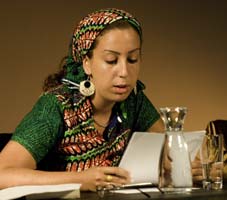
Faïza Guène
- France
- Zu Gast beim ilb: 2007
Faïza Guène was born in Bobigny near Paris in 1985. The daughter of Algerian immigrants, she grew up in the Parisian suburb of Courtillières (Pantin). Already as a teen she began to write and tried her hand at composition at various workshops. A tutor recognized the talent of the then thirteen-year-old and encouraged her to write more. In 2004 Guène made a masterly début with »Kiffe kiffe demain« (Eng. »Kiffe kiffe tomorrow«, 2006), and is today among the new young voices of French literature. The novel, which received attention worldwide, has sold more than 100,000 copies in France and has been translated into over twenty languages.
In tight sentences rich in imagery, »Kiffe kiffe tomorrow« tells the unembellished story of the life and daily routines of young girls in the Parisian suburbs: 15-year-old Doria lives with her illiterate mother in the Cité du Paradis while her father has abandoned the family to go to Morocco with a view to producing a longed-for son with a younger woman. As a result, Doria has to pay weekly visits to a psychologist whose hair smells of anti head-lice shampoo and who fails to understand her, despite being nice. There is also a perfectly manicured social worker, her pal Hamoudi, one of the »greats« of the Cité, and Nabil, »the Zero«, who brazenly stole her first kiss. See-sawing between astounding clear-sightedness and dreamy naiveté, refreshingly humorous without being schmaltzy, the author, in lively monologue, depicts the emotional world and thoughts of young Doria. Guène portrays the rage and frustration of French youths from socially deprived backgrounds and offers the insight that »time somehow goes on« despite adverse circumstances. »Her novels read like rap – and sell in hundreds of thousands. Faïza Guène speaks the language of the young people who turn the French suburbs upside down. And she understands them: ›They are overburdened by reality‹«, the daily »Die Tageszeitung« commented. In 2007 the German translation of »Kiffe kiffe tomorrow« was nominated for the German Youth Literature Prize.
In 2006 her second novel, »Du rêve pour les oufs« (t: Dream for the madmen), appeared, in which the 24-year-old first person narrator Alhème allows the reader to vividly »experience the drama of immigration and the pain of immigrants in the suburbs« (»Le Canard Enchaîné«). More serious and politically-minded than her first novel but deploying the same impressive wit, Guène tells of the great misunderstandings within French society. The author comments: »I didn’t want to assume the role of the flag-bearing girl from the suburbs, but that’s what happened since very few people from my ›class‹ are truly present in the media. When someone is actually heard, it is only natural that they speak out on behalf of the others.«
Alongside her literary output Faïza Guène has made various short films, including the documentary »Mémoires du 17 octobre 1961« (2002), which focuses on the massacre of peaceful Algerian protestors by Parisian policemen. When she is not on book tour around the world, Faïza Guène devotes her time to writing her next novel and carrying out her audiovisual projects.
© international literature festival berlin
Kiffe kiffe demain
Hachette littératures
Paris, 2004
Paradiesische Aussichten
Carlsen
Hamburg, 2006
[Ü: Anja Nattefort]
Träume für Verrückte
Ullstein,
Berlin, 2008
[Ü: Anja Nattefort]
Übersetzer: Anja Nattefort
